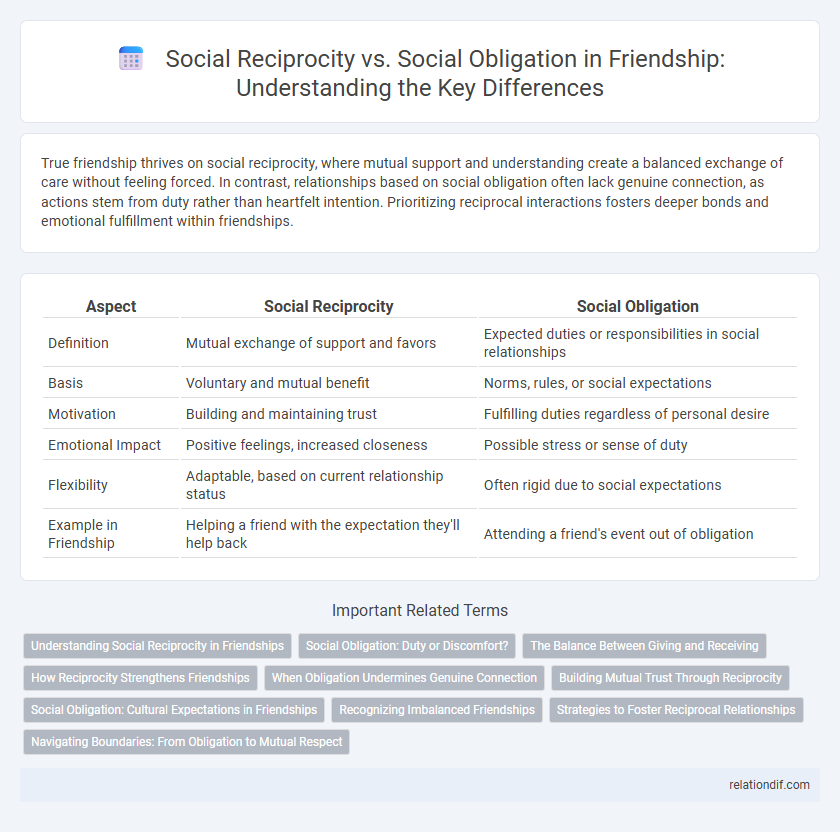True friendship thrives on social reciprocity, where mutual support and understanding create a balanced exchange of care without feeling forced. In contrast, relationships based on social obligation often lack genuine connection, as actions stem from duty rather than heartfelt intention. Prioritizing reciprocal interactions fosters deeper bonds and emotional fulfillment within friendships.
Table of Comparison
| Aspect | Social Reciprocity | Social Obligation |
|---|---|---|
| Definition | Mutual exchange of support and favors | Expected duties or responsibilities in social relationships |
| Basis | Voluntary and mutual benefit | Norms, rules, or social expectations |
| Motivation | Building and maintaining trust | Fulfilling duties regardless of personal desire |
| Emotional Impact | Positive feelings, increased closeness | Possible stress or sense of duty |
| Flexibility | Adaptable, based on current relationship status | Often rigid due to social expectations |
| Example in Friendship | Helping a friend with the expectation they'll help back | Attending a friend's event out of obligation |
Understanding Social Reciprocity in Friendships
Understanding social reciprocity in friendships involves recognizing the mutual exchange of support, trust, and emotional sharing that sustains the relationship. Unlike social obligation, which is driven by external expectations or duty, social reciprocity is grounded in genuine care and voluntary interaction between friends. This dynamic fosters deeper connection and balance, ensuring both parties feel valued and motivated to maintain the bond naturally.
Social Obligation: Duty or Discomfort?
Social obligation in friendship often feels like an implicit duty driven by expectations rather than genuine desire, creating discomfort when interactions become performative. This sense of obligation can undermine authentic connection and lead to stress, as individuals may prioritize obligation over mutual enjoyment. Balancing social obligation with personal boundaries is crucial to maintaining healthy and fulfilling friendships.
The Balance Between Giving and Receiving
Social reciprocity in friendship thrives on a balanced exchange of support, where both parties actively give and receive without feeling burdened. This dynamic fosters genuine connections, contrasting with social obligation, which often leads to one-sided interactions driven by duty rather than mutual care. Maintaining equilibrium between giving and receiving is essential for sustaining long-term, meaningful friendships that promote trust and emotional well-being.
How Reciprocity Strengthens Friendships
Reciprocity in friendships involves mutual exchange of support, trust, and kindness, creating a balanced emotional investment that deepens bonds. Unlike social obligation, which may foster relationships based on duty or expectation, reciprocity encourages genuine connection and voluntary cooperation. This mutual give-and-take reinforces trust and satisfaction, making friendships more resilient and meaningful over time.
When Obligation Undermines Genuine Connection
Social reciprocity in friendship fosters mutual affection and voluntary support, creating a foundation for genuine connection based on shared trust and care. When social obligation replaces choice, interactions often feel transactional and forced, eroding authenticity and emotional closeness. Compelled acts of kindness may lead to resentment or disconnection, highlighting the importance of voluntary engagement for sustaining meaningful relationships.
Building Mutual Trust Through Reciprocity
Building mutual trust in friendship relies heavily on social reciprocity, where actions are exchanged based on genuine care and shared benefit rather than enforced social obligation. This voluntary give-and-take fosters authentic connections, encouraging openness and reliability between friends. Trust deepens as both parties consistently support each other without feeling coerced, strengthening the emotional bond and long-term stability of the relationship.
Social Obligation: Cultural Expectations in Friendships
Social obligation in friendships reflects cultural expectations that dictate behaviors such as gift-giving, support during life events, and regular communication to maintain relational harmony. These unwritten rules vary across societies, shaping how individuals honor commitments and express loyalty within their social networks. Understanding social obligation highlights the influence of cultural norms over voluntary social reciprocity in sustaining long-term friendships.
Recognizing Imbalanced Friendships
Recognizing imbalanced friendships involves assessing the balance between social reciprocity and social obligation, where genuine connections thrive on mutual support rather than a sense of duty. Imbalanced friendships often manifest when one person consistently gives more time, energy, or emotional support without equivalent reciprocation, leading to feelings of resentment or exploitation. Understanding these dynamics helps individuals set healthy boundaries and prioritize relationships that foster authentic, reciprocal engagement.
Strategies to Foster Reciprocal Relationships
Effective strategies to foster reciprocal relationships in friendship emphasize mutual support, open communication, and shared experiences that promote trust and cooperation. Prioritizing active listening and expressing genuine appreciation encourages balanced exchanges and prevents feelings of social obligation. Establishing clear boundaries and consistently engaging in acts of kindness strengthens social reciprocity by reinforcing equal investment and emotional connection.
Navigating Boundaries: From Obligation to Mutual Respect
Navigating boundaries in friendship involves shifting from a sense of social obligation to fostering social reciprocity built on mutual respect. True friendship thrives when both parties engage willingly, balancing giving and receiving without feeling pressured by duties. This dynamic encourages authentic connections where respect and consideration replace transactional expectations.
Social reciprocity vs Social obligation Infographic

 relationdif.com
relationdif.com